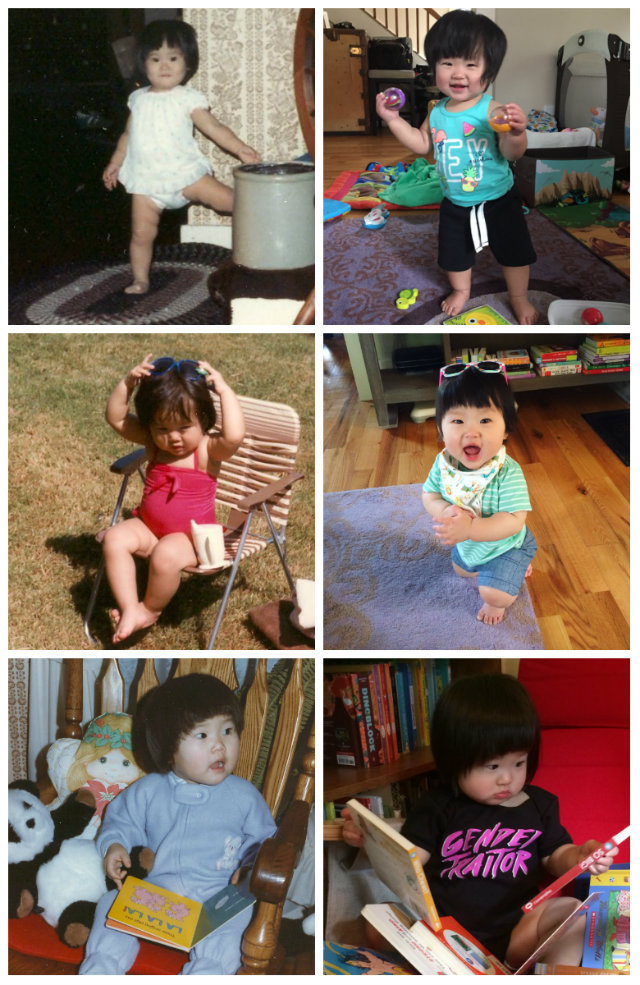By the time I got around to having my own kid, I’d spent over three decades imagining and actualizing myself as a writer, an activist, a queer feminist, but never as a “mom.” As queer people do, once Waffle and I decided we were going to have a baby, I spent two full years overprocessing everything I could imagine or predict about joining the mommy cult before I even got knocked up.
I kept processing it all during the pregnancy as a queer feminist pregnant hard femme. I documented a lot of that here, on Autostraddle, with all of you. Still, I wasn’t at all prepared for first time parenting. No one is. Some things you just can’t prepare for. The hardcore sleep deprivation, the zero-sum-game of trying to maintain a sense of dignity postpartum, the ritualistic hazing that is trying to force an overtired baby to take a nap, the constant feeding-changing-sleeping-crying routine.
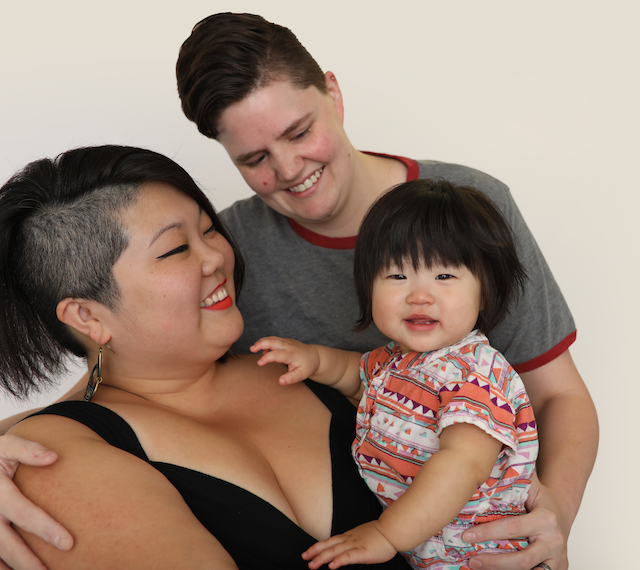
What I wasn’t even remotely prepared for was how parenting would affect me as an adoptee.
I spent some time processing pregnancy as an adoptee, but I didn’t anticipate the feelings I’d have about being adopted and raising a toddler who still isn’t as old as I was when I came to the United States on an airplane. I thought I’d banished those ghosts a long time ago, the questions that I used to ask my mom over breakfast when I was little: “Where am I from?” “Why did they give me up?”
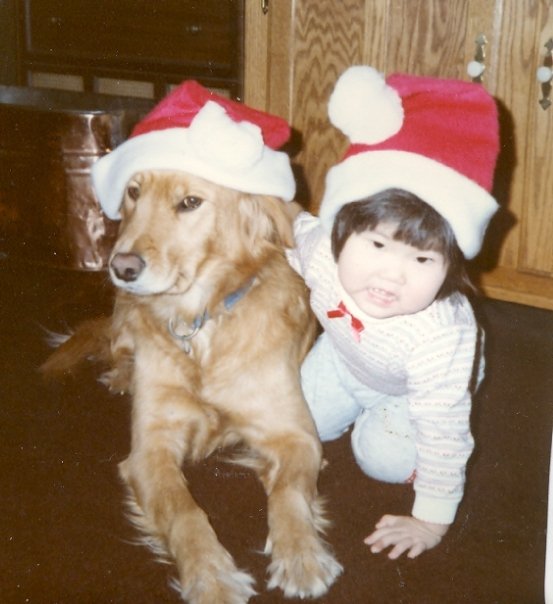
Recently, my 16-month-old baby has started to call for me by name in the morning: “Ma! Ma!” I always get up with her, something I resented in those early months but cherish now that we’re both sleeping through the night. (Parenting, like most things in a relationship, is so much playing to each others’ strengths. Waffle is a grouchy bear in the early morning. I can survive on less sleep and I was breastfeeding for the first six months, so I do my part on the wake-up shift. Waffle does his part in many other ways, like doing all the meal planning and grocery shopping.) Remi wakes up every morning knowing I’ll be there because I’ve been there every morning for the past 16 months, almost every single day of her life.
When I was a little over 17-months-old, I was delivered off a plane and placed into my parents’ arms and into my whole existence. Everything before that moment is gone, is vapor, a few translated sentences in my adoption papers. The loss of my history has never struck me the way it does now that I have a baby. I guess I’d always thought of babies as little, nonsensical, silly things. I didn’t know the difference between a one-week-old and a one-year-old until I carried my baby through that first year, from learning to latch to fighting over eating her vegetables.
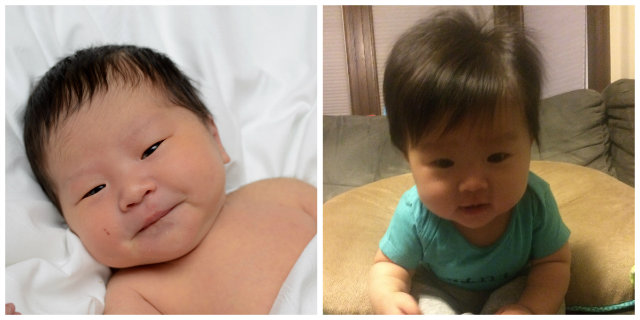
I didn’t comprehend that Little KaeLyn or, rather, Little Eun Jeong, had a whole 17 months of development and language and culture and food and exploration and family in another country halfway around the globe. Who I am was split in two at the moment I got on that plane to meet my new family. It might as well be a different person in a different world who lived my life before I came to the U.S. When I imagine it, it’s like imagining a foreign movie with subtitles or the plot of a book about Korean children, written by a visiting Western author. I will never get it back; even if I go to Korea now, as an adult, I’ll be a visitor. I can never go home to Korea, but Korea was my home. For 17 months, I was someone else. Home was somewhere else.
At 16 months, Remi knows the sound a cow makes (“Muh!”). She can bring me a book or a stuffed animal on request. She signs “more” fervently when she’s hungry and she loves cats (“Kah-Tah” as she says). She’s started sorting objects by type and loves to stomp her feet to music. She expects applause when she puts a ball through her Fisher Price basketball hoop. At 16 months, she knows a dozen baby words and understands more than that. Her favorite movie is Moana and she giggles or shrieks at her favorite parts. When she hears one of us in the bathroom, she runs in and drags her stool up to the bathroom sink to wash her hands. Right now, she’s double-fisting saucy strands of spaghetti and emphatically grunting, “Mmmmm,” between bites. At 16 months, she shows her love for us when she runs to meet Waffle at the door with a “Da! Da!” or when she grabs my neck in a big hug and gives firm, little pats on my arm (pat-pat-pat).
At 16 months, I knew…
At 16 months, I played with…
At 16 months, I said…
At 16 months, I loved…
At 16 months, I woke up and asked for…
Who Remi is, is so clear already. She’s cunning and likes to play little tricks on us. She’s a fearless adventurer who takes calculated risks and hard falls and gets up ready to try again. She is already insistently independent and wants to do everything herself. She’s a fast learner and a fast runner. She’s truly extra in every way and I love that about her.
My mom says we’re “exactly the same.” As she gets older, I definitely agree. Our pictures are almost identical to the untrained eye. But I wonder what I was like before my mom knew me. I wonder what words I said that no one in my American family could understand. I wonder how I interpreted getting on a plane in one world and popping out in another one, a new place where I couldn’t understand a single word and where no one could understand me. Surely, I was talking. Remi talks all day. Where did I think my biological parents went? How did I process moving to a home where nothing was familiar and where no one looked like me?
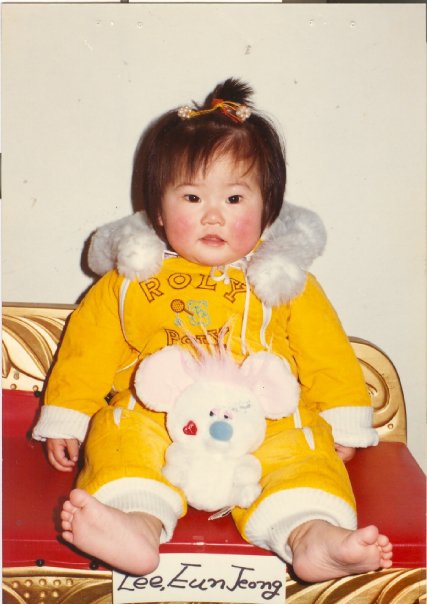
My mom and dad say I adapted quickly to my life in the U.S. and wasn’t afraid at all. I went right to them or to any stranger. I didn’t cry. I was a happy baby. I see that tenacity in Remi. She fears nothing. She adjusts quickly when traveling or going to the babysitter’s house or spending the night at Gramma and Grandpa’s house. She never seems to worry that we aren’t coming back. She’s so sure of herself.
Was I ever “just like” someone else? Are personality traits hereditary or chance? It’s hard to say, but I like to think that I’m getting a peek into who I might have been by knowing who Remi is. Her life story will be different than mine, a little more filled out, but it will still have gaps. Gaps in my history, that I can’t pass down to her. Gaps in the donor’s history (though we actually know way more about the donor’s biological family than we do about mine). And gaps where the complexity of being a Korean person in a mostly white family become painfully clear.
I went into parenting ready to reclaim “mommy” and ready to queer momminess. I didn’t expect to reclaim my need to explore my lost ancestry or my identity as Korean-American. I didn’t know that it would open something I thought I’d sealed up inside me a long time ago, the whispers of ancestors I can’t quite hear.
For now, I see parts of myself in my baby and it makes me feel simultaneously a little more empty and a little more whole. When I think about Remi growing up, I think about learning about Korean culture together, learning to cook Korean food for her, and ultimately about going back to Korea together. I just recently let myself say out loud that I’d like to do a birth family search, though I know how improbable is it that I’ll find anything. Anyone.
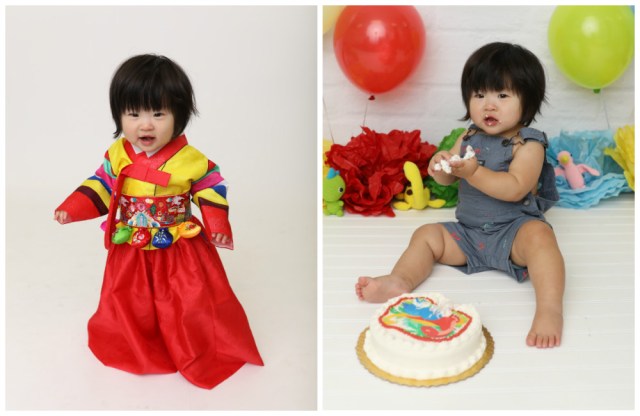
In a couple weeks, she’ll be the same age I was when my plane touched down at JFK airport. I’ll finally be able to put pictures of her and me side-by-side to compare.
